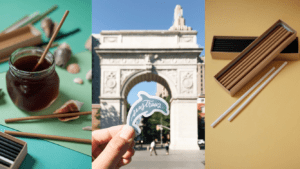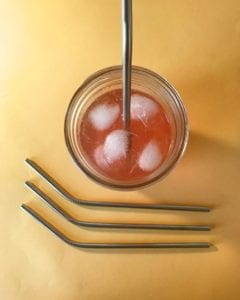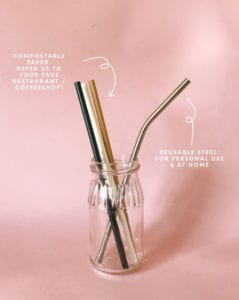In honor of Plastic Free July and in light of a pending NYC single use plastic straw ban, we sat down with Antonio DiMeglio ’20 a NYU Stern Finance student who founded SeaStraws.co, a for-profit enterprise that’s saving the ocean one straw at time.

SeaStraws’ mission is “to use drinking straws to accelerate the movement towards a plastic-free world.” Check out our interview with this young entrepreneur to gain key insight into his success, NYU’s contributions to start-ups, plastic straw alternatives, and more!
Why did you start Seastraws and what NYU resources helped you?
Antonio DiMeglio (AD): I started SeaStraws because I grew up going to the Jersey Shore and felt that I should personally contribute to a world full of friendlier oceans. Our connection to NYU has been essential to creating our company’s foundation, as a variety of professors have committed to serve on our external advisory board. Filling out the Green Grant* application also allowed us to legitimize our operations quickly, and the Stern Social Impact Stipend has provided us with financial support.
What factors lead you to start a company focused in sustainability- was there an NYU class/experience/professor that inspired you?
AD: My favorite class at NYU was Business & Its Publics (BIP) in my freshman spring, taught by Jessy Hsieh. BIP is a Stern class that encourages students to look at business issues from a broader perspective, taking apart the socioeconomic structures of government, the environment, and education. The class taught me how to break down a social issue and develop impactful solutions.
Rumor has it your team is all NYU students. How did you meet your colleagues and what do they contribute to SeaStraws?
AD: SeaStraws is nothing without its team, and every person involved in the company has a distinct role in our mission. The first eight people involved with SeaStraws were all NYU students. We’ve gotten to know each other quickly, and our culture is one of creativity and accountability. I’ve been lucky to have known everyone from NYU as a friend before starting the company, and never looked for people to get involved.
I heard you are applying for a B Corporation status. How does this process work – do you have any advice about the application process? What was your B Corp score?
AD: Yes, we are! Companies apply to be a BCorp when they are ready to structurally commit to social impact. The process involves taking the B Impact Assessment… the test is lengthy and examines your company’s environmental sustainability, employee transparency, and connections to charitable causes. SeaStraws received a score of 120, while the score to become a BCorp is only an 80. I attribute this score to our sustainable supply chain and internal radical transparency. We are currently in the process of making SeaStraws a BCorp Pending: this is the certification for startups. After a year with the Pending Certification, we will aim to become a BCorp with full certification.

What is your favorite SeaStraws product and why?
AD: My favorite product is our Reusable Steel straw pack. They come in a nifty bag of four with a cleaner inside, and are a wonderful way to be sustainable in style. All consumers can have a true impact by using, washing, and reusing their own steel or silicone straws.
Do you have partnerships with companies or nonprofits? If so, how did these partnerships come to be?
AD: We’ve begun partnerships with two significant marine nonprofits. The story of how the first one came to be is incredible, as the director of the foundation’s Australia branch found us on Instagram and then contacted us directly. He connected us to a representative from the headquarters in the US, and our relationship began from there. The other one was as a result of a cold email from Sophie, our Chief Sustainability Officer. My advice from here would be to always contact people that you want to work with – don’t ever be afraid!
It sounds like you do a lot of cold calling to promote and expand SeaStraws. What are the essential ingredients to a successful cold call or email?
AD: Cold email is a wonderful way to grow a company at scale. In your message, you need to communicate your value proposition clearly, effectively, and quickly. There should also be an end goal: for us, the last sentence includes a link to our Free50 sample program.

As major corporations like Starbucks pledge to be plastic straw free by 2020, where do you see SeaStraws in the mix and what new products are you planning to sell in the future?
AD: SeaStraws will grow through a series of partnerships. Although Starbucks is using the teardrop lid, I believe that we will remain committed to paper straws. SeaStraws will be known as the highest quality paper straw on the market, with a relatable brand that prioritizes education and our mission. However, it is difficult for members of the disabled community to use the current sustainable alternatives like paper or steel. So, we are developing a straw that is accessible for everyone. To ensure accessibility, these straws will also be sent with our bulk paper straw orders to ensure that our restaurants have an option on hand for anyone in need.
*SeaStraws in not currently funded by an Office of Sustainability Green Grant.

Cool, straws that don’t suck.. (anyone rember bbedit?!) Curious, is there an environmental or sustainability policy at NYU which guides on campus food vendors purchase decisions for things like.. well.. straws? Napkins? Etc.
For instance a line in this policy might read, “single use paper products must contain minimum X percent post-consumer recycled paper content.”
Does this policy exist?
we also have a wide range of experience in producing sheet metal products including scaffolding plants, took boxes, brackets, feeders, customized perforated metal sheeting and punched sheet metal, tanks, engine covers, and waste bins.